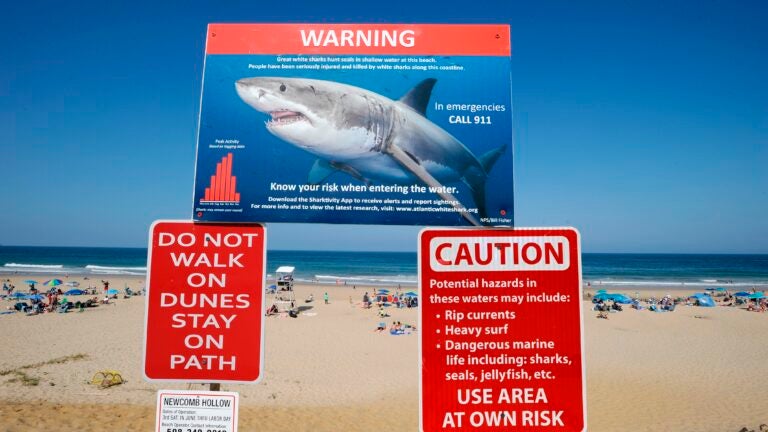Local News
“The abundance [of sharks] that we see out there is mind-blowing. … And they are quite close to shore.”

Massachusetts fisheries officials are cracking down on shore-based shark fishing, saying the state’s beaches are becoming a “hot spot” for anglers targeting white sharks in a quest for social media clout.
The Marine Fisheries Advisory Commission last month approved new restrictions on shore-based shark fishing, specifically targeting parts of the Cape Cod coast where white sharks are most common. While Massachusetts already bans people from attracting or capturing white sharks without special authorization, efforts to enforce those regulations have often hinged on whether authorities can prove an angler’s intent.
First reported by the Boston Herald, the updated regulations prohibit shore-based shark angling along Cape Cod Bay, beginning at the northernmost point of Plymouth Beach and looping around the Outer Cape, including Chatham Harbor and all of Monomoy Island. The rules also limit chumming during certain parts of the day when shore-based shark fishing and prohibit the use of mechanized and remote-controlled devices to deploy bait when fishing with rod and reel gear.
The new restrictions follow a high-profile incident last September where surfers at a Wellfleet beach called the police on three anglers who were purportedly fishing for sharks and using a drone to drop bait into the water near the surfers, as reported by The Provincetown Independent.
“It’s a huge public safety issue,” Jared Silva, a fishery policy analyst with the Division of Marine Fisheries, explained in a March 27 Marine Fisheries Advisory Commission meeting.
He said fisheries officials are concerned about the growth of online interest in shore-based shark fishing, pointing to a recent headline about North Carolina fishermen reeling in a great white shark on an Outer Banks beach.
“There’s a lot of social media clout that can be gotten from this, and we’ve kind of heard through the grapevine that Massachusetts is the hotbed, or is going to be the hotbed for this activity,” Silva added.
He emphasized the danger of anglers trying to lure white sharks onto the beach during the busy summer season, when tourists flock to Cape Cod en masse.
“They can’t coexist,” Silva said.
In a March 24 memo to the commission, Division of Marine Fisheries Director Daniel McKiernan recommended that officials take “decisive action to enhance our regulatory program before fishing activity further expands and increases the potential for conflict and public safety issues.”
The only Marine Fisheries Advisory Commission member to oppose the new restrictions was Tim Brady, who raised concerns about limiting access to permissible recreational fishing.
“I understand the intent, and I understand the potential user group conflict, but … are we also preventing somebody who’s targeting a different … large shark species, which they can target?” Brady asked.
Brady further questioned the chances of even attracting a white shark.
“I would argue that it’s quite easy to target a white shark, particularly along the eastward facing beaches of Cape Cod,” explained Greg Skomal, a shark biologist with the Division of Marine Fisheries. “The abundance that we see out there is mind-blowing. … And they are quite close to shore.”
The new restrictions, he said, give Massachusetts Environmental Police “the teeth they need to be able to enforce this activity.”
Environmental Police Lt. Matthew Bass noted officials could amend the policy later on as needed, but added, “I think we’ll just be prohibiting or just focusing on those white shark fishers coming from around the country looking for that viral video.”
Armed with the commission’s approval, the Division of Marine Fisheries said it will now commence the final rulemaking process and anticipates the updated rules will go into effect later this spring.
Sign up for the Today newsletter
Get everything you need to know to start your day, delivered right to your inbox every morning.

